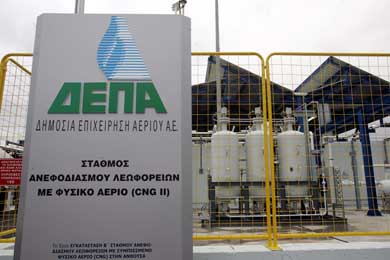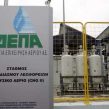
Gazprom and Its Proxies Bidding for the Gas Sector of Greece
Publication: Eurasia Daily Monitor Volume: 9 Issue: 74
By:

Fourteen companies, including Gazprom and three other Russian firms, are bidding to acquire DEPA and its fully-owned subsidiary DESFA, the Greek state-controlled gas transportation systems. Additionally, Gazprom is targeting Greece’s dominant oil company, Hellenic Petroleum, part-owner of DEPA, for possible acquisition. Apart from commercial considerations, the geopolitical implications of a Gazprom success could be momentous (see below).
The starting price of DEPA’s state-owned stake is generally assessed at $1.5 billion. Gazprom is bidding via its subsidiary, GazpromFinance. Along with it, three obscure Russian companies seem to be acting as Gazprom’s proxies in the bidding. One is Sintez Group, whose entire capitalization is valued at $150 million, but is bidding with borrowed funds, and says that if the bid is successful it would take GazpromFinance as its partner. The second is the Energy Investment Fund, headed by Gazprom’s board member and former energy minister, Igor Yusufov. The third and most obscure Russian bidder is Negus Neft (Vedomosti, April 3; Interfax, April 12).
Other bidders include Italian ENI, Italian Edison, Azerbaijan’s State Oil Company, and the Israel Corporation, all with active or potential transit interests in Greece and DEPA/DESFA.
According to Gazprom’s vice-president, Aleksandr Medvedev, Gazprom is targeting DEPA but not DESFA. This suggests, first, that Gazprom is wary of openly violating European Union legislation, which requires ownership separation (unbundling) of supply companies (DEPA) from transportation companies (DESFA). But Medvedev’s statement also raises the clear possibility that Moscow is targeting both DEPA and DESFA via four different Russian companies, only pretending to comply with EU legislation. Gazprom plans to use DESFA’s pipelines as part of the South Stream project. Accordingly, Medvedev warned the other bidders in his statement: “To obstruct South Stream would be a crime” (Interfax, April 7).
Greece is situated at the intersection of major gas transit projects. DEPA’s subsidiary, DESFA, is the designated Greek partner in Gazprom’s South Stream pipeline project (Russia-Bulgaria-Greece-Italy line). Concurrently, DESFA is a partner with Italian Edison in the Interconnector Turkey-Greece-Italy (ITGI) project for transportation of Azerbaijani gas to Europe. ITGI’s rival, Trans-Adriatic Pipeline project (TAP), led by Norway’s Statoil, now envisages coopting DESFA as a means of resolving their rivalry.
Azerbaijan’s State Oil Company offered last year to acquire a stake in DESFA. Greek acceptance of this offer would have incentivized – and could still incentivize – Baku to choose ITGI as the export route for Shah Deniz gas. Reciprocally, Greece indicated that Azerbaijan would receive a stake in DESFA, if the Shah Deniz producers’ consortium would choose ITGI as the export route to Europe. In February, the Shah Deniz consortium eliminated ITGI from consideration, but is reconsidering its decision at Italy’s insistence. Apparently, Italy and the Statoil-led TAP envisage combining the two rival projects and using the DESFA pipeline for the transit to Italy (Bloomberg, March 30).
DEPA owns and DESFA operates South-Eastern Europe’s sole large-capacity LNG terminal, at Revithoussa in Attica, receiving Algerian and Qatari LNG, with a send-out capacity of five billion cubic meters (bcm) per year, albeit under-utilized. DEPA/DESFA is also the Greek partner in the EU-backed Interconnector Greece-Bulgaria project, which could mitigate Gazprom’s pressures on Bulgaria and other South-Eastern European countries. Greece can channel regasified LNG from Revithoussa to reduce those countries’ dependence on Gazprom.
Within Greece, DEPA is the national importer of natural gas and wholesale supplier to the internal market, with an estimated 50 percent market share legally guaranteed until 2036. Gazprom holds the lion’s share of the Greek gas market; it delivered 2.9 bcm in 2011 to DEPA and directly to end-users through the joint venture Prometheus Gas. DEPA and DESFA hold monopolies in gas sales and gas transport, respectively. DESFA operates Greece’s gas transmission and distribution pipelines. Following recent gas discoveries under the Eastern Mediterranean seabed, Greece hopes for DEPA/DESFA to transit gas from Israel and Cyprus into Europe. It seems a very long shot, but is considered seriously in Israel, Cyprus and Greece.
The insolvent Greek state is auctioning off DEPA/DESFA (and some lesser assets) as a precondition to the financial bailout of Greece by the European Union and the International Monetary Fund. The Greek Public Asset Development Fund is managing the auction. Under the terms of the tender, DEPA (Hellenic Public Gas Corporation) and DESFA (Hellenic Gas Transmission System Operator) can be sold together or separately (bundled or unbundled).
DEPA is 65 percent state-owned, with the remaining 35 percent held by Hellenic Petroleum, which is itself 35.5 percent state-owned, and targeted by Gazprom. The Greek government is selling its entire stake from DEPA, and intends to keep some 30 percent of DESFA’s shares. Hellenic Petroleum’s state-owned stake is being auctioned off separately, and Gazprom’s oil subsidiary GazpromNeft has already announced its interest (Interfax, April 6, 7; Kathimerini, April 10).
Control of DEPA/DESFA would enable Gazprom to promote its own international projects, block rival projects outright, or elbow its way into those rival projects. It would also result in Gazprom’s outright capture of Greece’s gas sector, boost Russia’s already strong economic and political influence in that country, and provide a springboard for Gazprom’s expansion farther afield.




